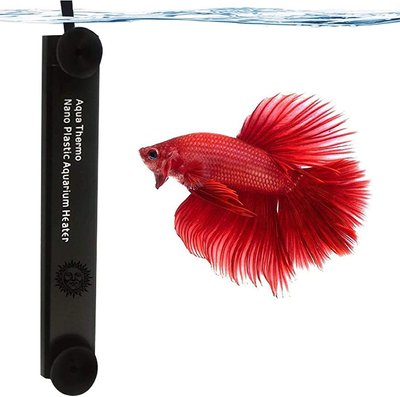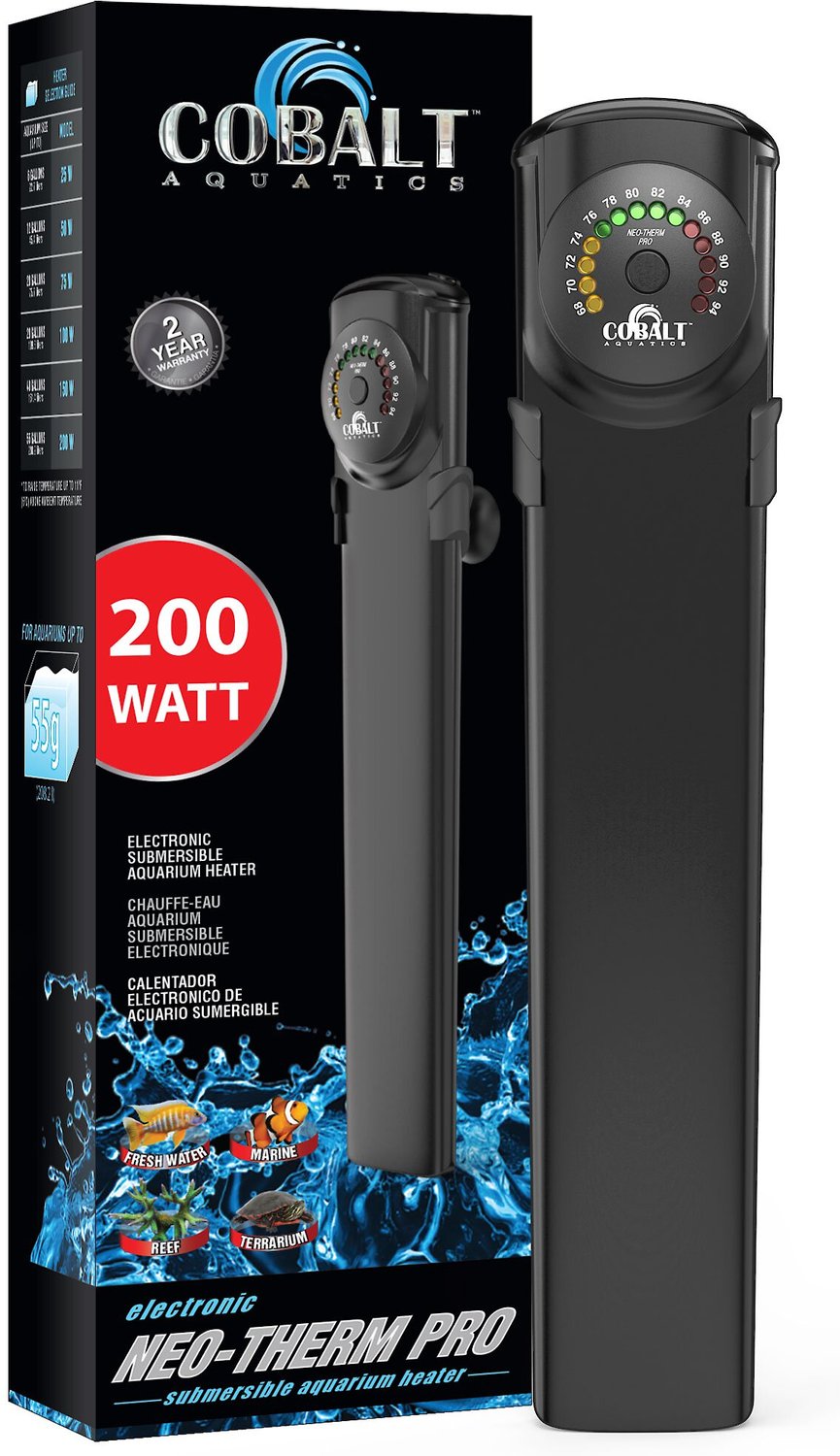Do Betta Fish Need A Heater (Can they live in cold water)
If you are setting up a betta tank for the first time, there are many things that you need to consider, such as tank size, heaters, and filters. In this article, we will be answering the question, Do betta fish need a heater, or can they get by without one?
Betta fish are tropical fish that live in warm tropical water. Betta fish can survive in slightly colder temperatures, similar to the temperature changes in their natural environment, but this is not ideal in the long term. You will usually require a heater to replicate these warm temperatures.
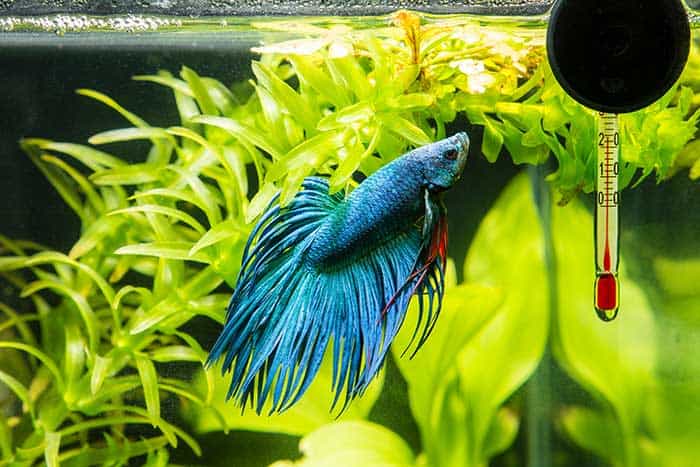
Ideal Temperature For Betta Fish
The ideal water temperature for betta fish is between 78°F to 80°F (25.5°C – 26.7°C), although betta fish can live outside of this range at between 72° and 86° Fahrenheit (22.2°C – 30°C).
The primary consideration for betta fish is that the temperature remains stable as they are not very tolerant of heavily fluctuating temperatures that can cause shock, resulting in stress which can lower a betta’s immunity to illness.
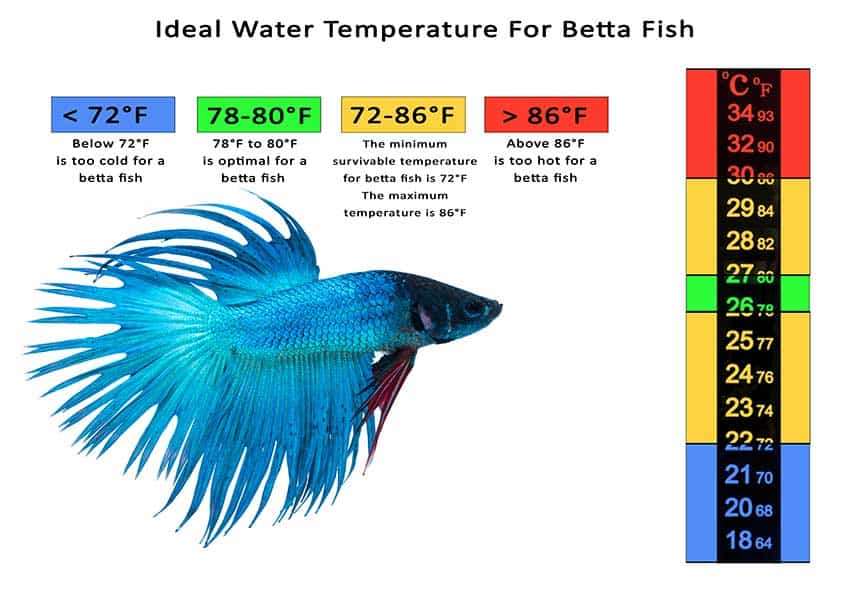
Your betta fish lifespan can be greatly improved when water conditions are optimal.
Can Betta Fish Survive In Cold Water?
Because betta fish are tropical fish, they cannot survive in cold water. Betta fish are native to areas of Southeast Asia which has a year-round tropical climate. Betta fish are cold-blooded animals that use the temperature of their environment to warm up. They are known to bury themselves in a fine layer of mud during colder periods to increase body heat and keep warm.
What Happens If Your Betta Gets Too Cold?
Cold water will cause a betta’s bodily functions and metabolism to slow. Your betta’s activity level will decrease, resulting in less movement, and its health will slowly deteriorate. Cold water can also lower your betta’s immune system, making them susceptible to all kinds of bacterial, parasitic, or fungal illnesses.
Many illness-causing bacteria and parasites are present in aquarium water even when your betta fish is healthy. It only becomes a problem when your betta’s immune system is not functioning as it should.
Some of the most common illnesses and conditions that your betta may develop are:
- Betta fin clamping or curling.
- Betta fin rot.
- Betta white spot or ich (ick).
- Betta Swim Bladder Disease.
- A Constipated betta fish.
- Betta stress stripes.
- Dropsy
- Popeye
I have linked most of the conditions above to articles I have written about them.
If your betta fish falls foul of an illness due to an impaired immune system, it will be more likely to suffer long-term effects or even die. You should get to know your betta’s usual behaviors so that you can better tell when something is wrong.
You should read: Betta behavior before death, to help you recognize some very important signs that your betta may be very unwell.
Another issue caused by cold water is that you may notice your betta fish not eating. The slow metabolism caused by the cold water will zap your betta’s energy levels, reducing its appetite and causing your betta to sleep more than usual. You may see your betta’s color begin to fade as they slow down and try to conserve energy.
As you can see from above, cold water is not suitable for betta fish, and should the temperature fall suddenly or too much, temperature shock may set in and reduce your betta’s chances of survival to only a few days or a few weeks.
The short video below provide a good overview of whether betta fish can live in cold water.
Betta Fish Temperature Shock
Betta fish temperature shock is caused by a sudden or significant change to the tank water temperature. Although warmer or colder temperature changes can cause temperature shock, it is more often caused by cold water.
The symptoms of temperature shock are similar to those experienced by a human suffering from hypothermia (reduction in body temperature) or hyperthermia (rise in body temperature). Any dramatic change to the core temperature can severely impact the body’s vital functions.
Once temperature shock affects your betta fish, you need to return the water temperature to normal as quickly as possible, or your betta’s organs may begin to shut down, and death can be imminent.
Can Betta Fish Live Without A Heater?
Betta fish can live without a heater when in the right environment, but maintaining the temperature at night and throughout the year is much more difficult. So, do betta fish need a heater?
In tropical regions, the ambient room temperatures are typically warm enough to heat the water to an optimal temperature range throughout the day without a heater. Nighttime can be a problem when temperatures drop.
As I’ve previously stated, constantly changing water temperatures will stress your betta fish, so you must maintain a consistent temperature if you want your betta to remain healthy.
Your betta tank size will play an essential part in reducing temperature fluctuations. The water temperature in a tiny betta tank changes rapidly compared to a bigger tank since a larger body of water will hold its temperature for longer, and adjustments will be slower.
Some ways to help keep your tank warm overnight are:
- Use a lid on your tank.
- Keep the tank away from draughty areas.
- Turn your heating system on for a few hours overnight.
- Place a small fish tank safe water bottle at one end of the tank with a divider to keep your betta fish away.
You can find more ideas in a similar article: How Long Can Tropical Fish Live Without A Heater.
How Long Can A Betta Fish Live Without A Heater?
Betta fish can live without a heater indefinitely if the ambient temperature is consistent and warm enough to heat your betta tank suitably. If your betta water becomes too cold, your betta may only last six months or much less if temperature shock takes hold.
If your betta heater has broken down and your betta tank’s temperature begins to drop significantly, you will need to find suitable methods to keep your betta fish warm and your tank water at a constant temperature until you can source a new heater.
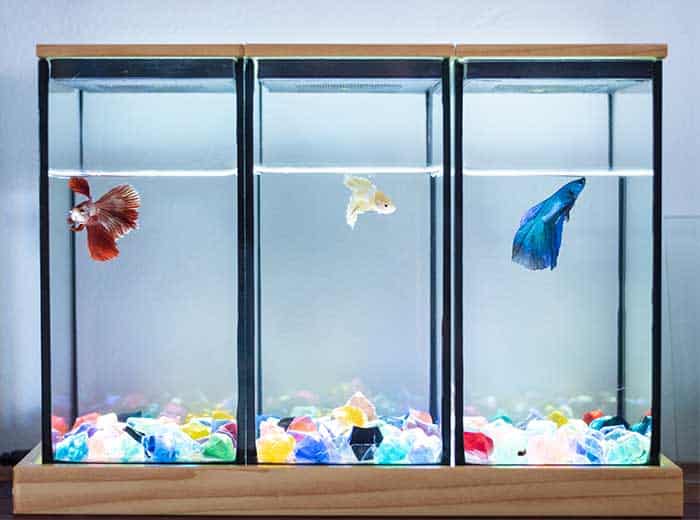
Due to the potentially severe issues that can be caused by a sudden drop in temperature, my recommendation is that you always keep a spare heater to prepare for malfunction and breakdown.
Choosing A Heater For Betta Fish
Choosing an appropriate heater is not a difficult task, and there are many options to choose from. Before choosing a betta heater, you will need to consider the size of your betta tank, the wattage of the heater, and the optimal water temperature you wish to maintain.
Some aquarium heaters are adjustable within a wide temperature range, or you can get a heater that is preset to a specific temperature.
Below is a selection of aquarium heaters that I can recommend. Each heater comes in varying wattages with advice on suitable tank sizes for its power output.
SunGrow Betta Fish & Turtle Aquarium Tank Water Heater, 10-watt
A compact 10W heater is ideal for tanks up to 3.5 gallons. Completely automatic thermostat programmed to heat your tank to a consistent 75°F, perfect for betta fish. This heater is encased in toughened plastic to protect your betta from burns.
Eheim Jager Thermostat Aquarium Heater 50W
A simple, fully submersible aquarium heater with auto-calibration and an auto-run-dry, shut-off safety feature.
This 50W heater is suitable for aquariums of 5-15 gallons.
Multiple power options are available from 25-300W for larger aquariums.
Cobalt Aquatics Electronic Neo-Therm Pro Submersible Aquarium Heater – 200W
My favorite heater in this list, the neo-therm pro has an advanced thermostat, is adjustable from 68°F to 94°F, and is accurate within a plus/minus range of .5 degrees. The LED display reads both the set temp and the tank temp simultaneously.
Built-in thermal protection circuity shuts down the heater before it can overheat, and the shatterproof casing is virtually indestructible.
This heater has a 200W output, suitable for aquariums of 50-60 gallons.
This heater is available in wattages from 25W to 200W, suitable for many aquarium sizes.
How To Warm Betta Fish Water
Warming betta fish water is best done with a heater. Once the submersible heater has been installed correctly using suction cups, you will need to adjust it to the required temperature and leave it to sit for 3-6 hours while it slowly brings the tank water up to the correct temperature.
Fish tank heaters are thermostat controlled, so they will automatically switch off and on to regulate the temperature that has been set.
It is always wise to install a thermometer in your betta fish tank to check the water temperature visually. When choosing a thermometer, it is best to pick one that you can install inside the tank. It will give a more accurate reading than an external thermometer that the ambient room temperature can influence.
To ensure all the tank water has been heated evenly, you should install the thermometer at the opposite end of the tank, furthest from the heater.
Once your thermometer displays the correct temperature suitable for your betta fish, you should wait another hour as fine adjustments are often necessary if the heater doesn’t shut off and instead continues to heat the water further.
How To Heat A Betta Tank Without A Heater
If you are not using a heater, or your heater has broken down, there are a few methods that you can use to heat your betta tank.
The most common methods to bring a betta tank up to the correct temperature without an aquarium heater are:
- Leave the tank to warm naturally – Larger tanks can take a day or more to reach the correct temperature.
- Add some warm treated water directly to the tank – If your betta fish is in the tank, you should add the water carefully, away from your betta fish.
- Place a (warm) hot water bottle in the tank – This should only be done in a larger betta tank as the heat transfer can happen quickly. Also, make sure not to allow a hot bottle to make contact with the tank glass, or it could crack. It would be best if you also placed a divider between the bottle and your betta fish to protect your betta.
- Place a wrapped hot water bottle against a smaller betta tank – As the tank glass warms, the heat will transfer through and heat the water quite quickly.
- Place your betta tank under a warm lamp – Don’t get the bulb too close, as your betta can jump and burn itself on the hot bulb.
- Place your betta tank close to a warm sunlit window – Too much sunlight can promote algae growth in a fish tank.
- Rest your betta bowl on a heating pad – Heating pads are ideal for smaller betta tanks or bowls to rest on, or you can rest the heating pad against the glass of a larger tank.
Wrap Up
Betta fish are tropical fish that will need warm water for good health and longevity. Whether you use a heater or not, you will need to ensure the water remains at a consistently warm temperature, or you will likely stress your betta or cause temperature shock.
Warmer climates may provide enough heat to warm your betta tank naturally, but you need to maintain the heat throughout the night when the temperature drops.
Using a heater is the easiest way to heat your betta tank. Heaters typically don’t use much energy and will switch on and off, keeping the water at the correct temperature without the need for any intervention.
A good betta tank heater will keep your tank temperature stable and your betta warm and comfortable. Providing the best water conditions is the easiest way to keep your betta healthy.


